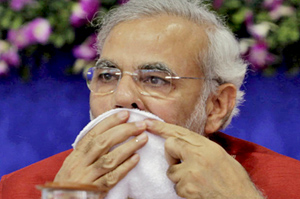New Delhi, Feb 03: Prime Minister Narendra Modi is facing his first state election defeat since taking charge last year, opinion polls show, a result that would dent his chances of consolidating power needed to speed up an economic recovery.
The ruling Bharatiya Janata Party has ordered scores of its top national and state leaders to campaign for this weekend's high-profile election to the Delhi assembly where a small anti-corruption party is threatening to stop its momentum.
But even the appointment of Finance Minister Arun Jaitley to oversee the campaign while he is writing this month's national budget may not be enough.
"This is the first time that we may see Modi's momentum stopped and that will be a shock," said Satish Misra, a political analyst at the Observer Research Foundation. "Despite putting every last drop of energy into this campaign, it looks like the BJP is heading for defeat."
Modi needs to win most of the state elections over the next four years to gain control of both houses of parliament to deliver on his promise of jobs and economic growth. The Rajya Sabha, where his party is in a minority, is frustrating his efforts to pass laws related to tax and foreign investment.
The BJP's campaign has been marked by infighting with party workers frustrated that Kiran Bedi, the first woman officer in the Indian Police Service, was appointed as the party's chief ministerial candidate - even though she wasn't a party member until three weeks ago.
India's most powerful Hindu group, the Rashtriya Swayamsewak Sangh, which is also the ideological parent of the BJP, said on Tuesday the party was struggling in Delhi and criticised Bedi, saying she was unpopular.
The Aam Aadmi, an anti-corruption party, is on course to win between 36 and 41 of the 70 seats in the Delhi assembly, according to three opinion polls published this week.
The BJP is on course to win between 27 and 32 seats and the Congress party, which has dominated politics over the last century, will win between two and seven seats, its worst-ever performance in the city, the polls show.
The vote will take place on Feb. 7 and the results will be announced three days later.
BJP spokesman Sudhanshu Mittal dismissed reports that the party was getting nervous about a likely defeat.
"Who said we are in panic? We will deploy all the resources at our command. This is Delhi. Ministers and parliament members live here. Why should they not campaign?"





Comments
Add new comment